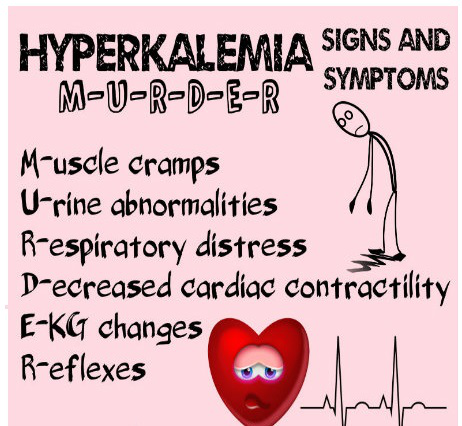to much potassium in blood
Potassium is a mineral that helps. Elevated potassium occurs either because the body cannot eliminate the excess effectively or because a condition or symptom is causing too much to be released into the bloodstream.
/hyperkalemia-diagnosis-5ad4e1341f4e1300389f0fa3-5f698382e7ed4a7293c3e8bb17383c20.png)
Potassium Blood Test Uses Side Effects Procedure Results
A condition known as hyperkalemia arises when the blood potassium level rises above 55 mEqL.

. Diabetes may also be one of the causes leading to hyperkalemia. Hyperkalemia occurs when potassium levels in your blood get too high. As our body does not produce potassium naturally its essential to consume the right balance of potassium-rich foods.
Nerves and muscles communicate nutrients move into cells and waste products move out of cells the heart function healthily. When they do those symptoms are often mild and nonspecific including common complaints like fatigue and generalized weakness. Higher than normal potassium levels in the blood could be a sign of kidney disease for example.
Potassium sodium tartrate KNaC 4 H 4 O. Blood potassium levels should be between about 35 and 5 millimoles per liter mmolL. Side effects range from excess intestinal gas to low blood pressure and paralysis.
Mild hyperkalemia typically causes no symptoms but very high potassium levels may cause problems like muscle weakness or dangerous heart rhythm. We know that too much sodium is bad for blood pressure so the kidneys have a mechanism to excrete excess sodium to maintain blood pressure. The most common cause of genuinely high potassium hyperkalemia is related to your kidneys such as.
Other causes of hyperkalemia include. The medical term for having too much potassium in the bloodstream is hyperkalemia. The diagnosis is made when levels in the blood are greater than 55 mEqL.
Potassium helps the kidneys eliminate excess sodium instead of storing it explains. It is a life-threatening condition. Your blood potassium level is normally 36 to 52 millimoles per liter mmolL.
So its clear that people with kidney problems should be very careful with their potassium levels. Addisons disease adrenal insufficiency Angiotensin II receptor blockers. But too much potassium in your blood can damage your heart and cause a heart attack.
A potassium level higher than 55 mmolL is critically high and a potassium. When levels go persistently higher the resulting condition is called hyperkalemia. Having too much potassium in the blood can cause symptoms such as palpitations shortness of breath chest pain even death.
Reduced kidney function improper protein metabolism and infections are some of the causes of hyperkalemia. You get potassium from food but this potassium can build up in your body if you have kidney problems. Even if you dont have any symptoms high potassium must be treated as there.
According to the Mayo Clinic a normal range of potassium is between 36 and 52 millimoles per liter mmolL of blood. Angiotensin-converting enzyme ACE inhibitors. Potassium in the form of potassium chloride is used as a medication to treat and prevent low blood potassium.
It is given by slow injection into a vein or by mouth. A potassium level that is too high or too low can be serious. Potassium contributes directly to lowering blood pressure through its interaction with the kidneys and with sodium.
Potassium is a chemical that is critical to the function of nerve and muscle cells including those in your heart. A potassium test measures the amount of potassium in blood serum the fluid part of your blood. You may not have any symptoms of high potassium until the level becomes dangerously high.
Potassium 4 Signs You May Be Consuming Too Much Potassium Evidence Based Written by Carly Dolan on August 10 2014 Although its easier for a healthy adult to run a potassium deficiency than take in too much potassium it could be that youre overdoing it. How Much Is Too MuchAn excess of potassium in the blood is known as hyperkalemia. If you have hyperkalemia you have too much potassium in your blood.
Potassium is a mineral that helps to keep your nerves and muscles working properly. Normally the potassium concentration in the blood should be between 36 and 5 mmol L. 1 Interestingly most people do not get any symptoms from it.
Potassium is necessary for the body to function properly but too much potassium in the blood can cause a lot of problems. A high level of potassium in your blood can be dangerous for your heart. Hyperkalaemia is a condition where you have too much potassium in your blood.
The condition is characterized by a blood level higher than 50 mmol per liter and can be dangerous. Your kidney team will check your potassium level every time you have a blood test. A potassium blood test is used to measure the level of potassium in the blood.
You cant always tell when your potassium levels are high. High potassium medically known as hyperkalemia is a common laboratory finding. The body needs a delicate balance of potassium to help the heart and other muscles.
Abnormal potassium levels may cause symptoms such as muscle cramps or weakness nausea diarrhea frequent urination dehydration low blood pressure confusion irritability paralysis and changes in heart rhythm. This nutrient helps your nerves and muscles function. Low blood potassium may occur due to vomiting diarrhea or certain medications.
Having a blood potassium level higher than 60 mmolL can be dangerous and usually requires immediate treatment. This can lead to a build-up of potassium in your blood. For a healthy adult there is no significant evidence that potassium from foods can cause hyperkalemia 16.
This condition can interfere with the bodys ability to regulate heart rhythm and provide adequate muscle strength. Taking in too much potassium can cause temporary or long-term health problems. Potassium is an essential nutrient found in foods.

What Causes Low Potassium How To Treat Hypokalemia

Supplement Overdose Too Much Potassium To Lower High Blood Pressure Could Be Deadly Express Co Uk

Increasing Potassium Intake To Prevent Kidney Damage A New Population Strategy Kidney International

10 Effects Of Hyperkalemia On The Body
/hyperkalemia-symptoms-5ad4e0b0642dca00363403f9-632e11ad1a4149e181fe7be2519de615.png)
Hyperkalemia Overview And More

Why Extremely High Levels Of Potassium In Blood Can Kill Your Patient Steemit
High Potassium Hyperkalemia Causes Prevention Treatment American Kidney Fund Akf

Potassium Modulates Electrolyte Balance And Blood Pressure Through Effects On Distal Cell Voltage And Chloride Sciencedirect
0 Response to "to much potassium in blood"
Post a Comment